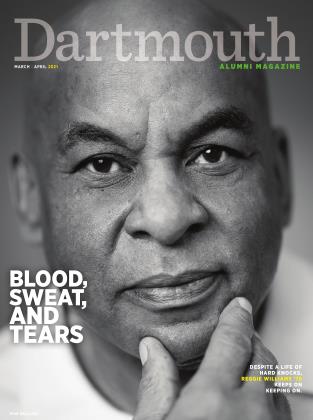ASK THE EXPERT How to Use Affirmations
notebook
CAMPUS
KATHRYN LIVELY PROFESSOR OF SOCIOLOGY/DEAN OF THE COLLEGE
Affirmations are written statements designed to create self-change. They are most frequently used to create persistent change in a specific area of one’s life. They can also focus attention on goals throughout the day, which can promote positive and sustained change. Generally speaking, affirmations are used to reprogram the subconscious mind, to encourage us to believe certain things about ourselves or about the world and our place within it. They are also used to help us create the reality we want—often in terms of making, or attracting, wealth, love, beauty, and happiness. Recent research suggests that self-affirmations buffer stress and improve problem-solving in underperforming and chronically stressed individuals. Here are tips for developing your own affirmations.
WRITE IN THE FIRST PERSON.
Begin with “I” or “I am.” These words create statements of identity, which are powerful motivators for self-change. Examples: “I am secure and confident speaking in public,” “I enjoy eating healthy food,” “I love to exercise,” and “I am a loving and compassionate person.”
DON’T BE NEGATIVE.
Always state your affirmations in the positive. For example, instead of saying, “I no longer enjoy the taste of cigarettes,” you might say, “I am completely free from cigarettes” or "I am a healthy person and I love the way my body feels when I make healthy choices.”
IMBUE YOUR AFFIRMATIONS WITH FEELING.
Affirmations have an emotional charge. Including emotional words is important because of the deep association we have between emotion words and somatic experiences. Instead of saying, “I spend time with my aging parents,” try “I feel such love and gratitude spending time with my mother and father.” Or instead of “I only eat healthy food,” which sounds suspiciously chore-like, try “I feel vibrant and alive when I make healthy choices for me.”
WRITE YOUR AFFIRMATIONS AS IF THEY ARE ALREADY HAPPENING.
This means affirming that “I am happy and confident” instead of “Two months from now I will be happy and confident” or “I am healthy and attractive” as opposed to “When I lose these last 10 pounds I will be healthy and attractive.” This step causes most people to falter, because sometimes they feel silly or disingenuous writing something they don’t yet believe— at least at a conscious level—is true. But remember, the purpose behind affirmations is to rewrite your subconscious mind, not your conscious mind.
EUREKA!
NEW FINDINGS AND RESEARCH J
Reindeer Games
Lawmakers underperform as investors.
As the pandemic started to hit last year, several members of Congress came under scrutiny for lucrative trades in tech and healthcare stocks they made following private briefings. But an analysis of U.S. Senate and House members’ short-term trades found they performed in line with the market or modestly lagged. “Stock picking is hard,” says economics professor Bruce Sacerdote ’90. “It’s not a game. It’s easy to get fooled into thinking you’ve got an inside edge.”
In an update in December to their paper published by the National Bureau of Economic Research last April, Sacerdote and his students found that Santa’s reindeer did better at picking stocks than lawmakers. The study’s methodology was well-grounded:
The team recorded the prancing and pawing of each reindeer hoof on Wall Street Journal stock pages spread out on the barn floor at Santa’s Village in New Hampshire. The reindeer outperformed the S&P by more than 70 percent on an annualized basis.
Echo Chambers
Political ads can backfire.
Countless millions are spent on extreme political messages and social media, but research published in December in Physical ReviewX shows such efforts can be counterproductive. They lead to polarization and drive people into political echo chambers, says Feng Fu, assistant professor of math and the study’s senior researcher. Using a statistical model based on retweets and hashtags during 2016 election debates, his researchers also concluded that attack ads may solidify the support of existing backers but are less likely to sway undecided voters in the middle of the political spectrum.
COVID-19
8
Days of quarantine required for returning students in January
QUOTE/UNQUOTE
“It is a reverence for the sanctity of our democratic process that unites us, not the results of any one election that divide us. Now is the time we must come together." —President Phil Hanlon '77 on January 6
 View Full Issue
View Full Issue
More From This Issue
-
 Sports
SportsBlood, Sweat, and Tears
MARCH | APRIL 2021 By RALPH WIMBISH -
 Features
FeaturesReconstruction Radical
MARCH | APRIL 2021 By ALLAN A. RYAN ’66 -
 Books
BooksGreat Escapes
MARCH | APRIL 2021 -
 notebook
notebookA Tragedy Runs Through It
MARCH | APRIL 2021 By RICHARD BABCOCK ’69 -
 Interviews
Interviews“I’ll Take the Body Blows”
MARCH | APRIL 2021 By DIRK OLIN '81 -
 CLASS NOTES
CLASS NOTESDeaths
MARCH | APRIL 2021
Notebook
-
 notebook
notebookNEWS AND NOTES
MAY | JUNE 2018 -
 Notebook
NotebookUPFRONT “Humane Thinker”
JULY | AUGUST 2025 -
 Notebook
NotebookDesigner Mindset
SEPTEMBER | OCTOBER 2025 -
 Notebook
NotebookLEAN ON ME
SEPTEMBER | OCTOBER 2024 By ABIGAIL JONES '03 -
 notebook
notebookLOOK WHO'S TALKING
JULY | AUGUST 2022 By Julia Robitaille ’23 -
 notebook
notebookLOOK WHO'S TALKING
JANUARY | FEBRUARY 2020 By Lucy Turnipseed ’22







